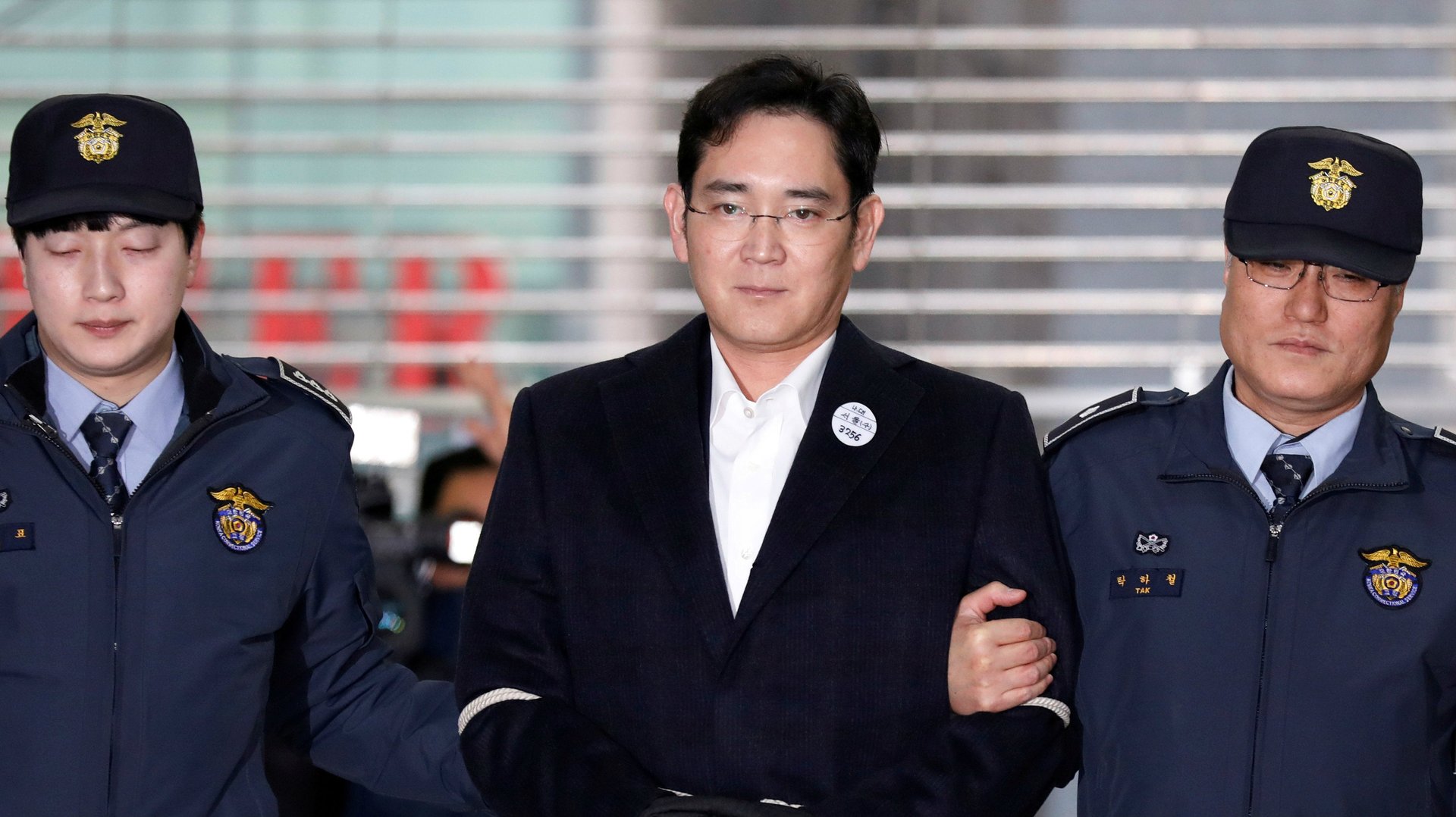Prison, a patsy, purgatory: possible outcomes as the Samsung empire’s heir awaits a verdict on bribery charges
On Friday, South Korea will be watching to see if the heir to the corporate juggernaut that includes the world’s largest smartphone maker, Samsung Electronics, gets thrown in prison.


On Friday, South Korea will be watching to see if the heir to the corporate juggernaut that includes the world’s largest smartphone maker, Samsung Electronics, gets thrown in prison.
A court is set to deliver a verdict Aug. 25 for Lee Jae-yong, the Samsung conglomerate’s 49-year-old acting head, who was charged in March with bribery and embezzlement. Lee, who has been detained since his arrest in February, has denied wrongdoing, as have four other Samsung executives—some of whom have offered to resign—also on trial. The verdict will come days after Samsung unveiled the Galaxy Note 8, its competitor to Apple’s upcoming iPhone 8.
Prosecutors allege that Lee and other Samsung executives funneled $38 million (paywall) to Choi Soon-sil, a personal confidant of former president Park Geun-hye. Park was impeached in March and is on trial separately for corruption. In exchange, they allege, Samsung won political influence—most notably when Korea’s National Pension Service approved a merger between two Samsung firms, Samsung C&T and Cheil Industries, effectively the conglomerate’s holding company. The deal, observers state, gave Lee more power over the larger Samsung group at the expense of minority shareholders in the two merged companies.
Lee became Samsung’s de facto leader when his father, current chairman Lee Kun-hee, was hospitalized after a heart attack in 2014. He has generally avoided the spotlight throughout his rise within the company. Lee’s official title is vice chairman at Samsung Electronics, and he was elected to the company’s board last year, as it grappled with the recall of its fire-prone Note 7 mobile phone. But the extent of his involvement in overall strategy or the day-to-day operations in each of its numerous units remains unclear (paywall).
The court will now face a dilemma. A harsh sentence risks derailing the economy’s single most important company. Samsung Electronics, Samsung Group’s consumer electronics and components division, brought in revenue equal to 201.87 trillion won (about $180 billion) in 2016, equivalent to roughly 14% of South Korea’s GDP. Yet an acquittal or a light sentence would anger Koreans who want to see the reform of Korea’s family-run corporate giants, or chaebol, perceived by many in the country as corrupt and poorly managed. The country’s new president, Moon Jae-in, was elected in May in part on a campaign to rein in these businesses. Prosecutors earlier this month asked the court for a 12-year sentence for Lee, with Reuters said would set a record for a corporate executive in Korea.
Experts on Samsung agree Lee will likely be found guilty of bribery, in part due to weak defense tactics. When asked about the specifics of the controversial merger, Lee said (paywall) he had “no knowledge of the business that Samsung C&T and Cheil Industries were involved in. And when asked about the payments to the president’s confidant, he said he was “not familiar with the details.” Pleading ignorance will be unlikely to sway judges to Lee’s side, according to Sangin Park, a professor of economics at Seoul National University, and a proponent of chaebol reform. The law firm representing Lee declined to comment.
Ruling families at each chaebol typically exert a vast influence across their corporate empires. A South Korean legislator appeared unconvinced when Lee took a similar stance earlier at a televised December parliamentary hearing: “Do you think you’re doing a good job as the head of a global company like Samsung by saying that you don’t know?”
Yet even if Lee is found guilty, that doesn’t mean he’ll serve a long prison sentence, let alone one lasting 12 years.
One observer, who asked not to be named citing connections to Samsung, said he expects Lee to get off with a short sentence lasting less than a year. Afterwards, he could be placed away from the public eye in Korea—perhaps at a university overseas, or at Samsung’s Silicon Valley outpost—while still maintaining a role at the company. It will be difficult for the court not to convict, he says.
“But they still need Samsung to not fall apart,” he adds. “Still, it looks really bad to Koreans if Lee comes right back, so exile has been a popular way to deal with the need to lay low.”
Korea-based journalist Geoffrey Cain, author of an upcoming book about Samsung, suggested the court could also meet the public’s desire for dealing with chaebols more severely by doling out serious jail time to Choi Gee-sung, one of the other charged Samsung executives on trial, rather than to Lee. While Choi shares the same title at Samsung Electronics as Lee, he helped pave the way for Lee’s succession and served as his mentor. In August testimony at Lee’s trial, Choi took most of the blame, claiming that he bribed Park’s confidante without Lee’s knowledge, and downplaying Lee’s involvement at the company.
Another alternative—chaebol leaders who have been convicted in the past have often received presidential pardons before they finish serving their sentences. Cain also suggests that if Lee is imprisoned, a pardon could be issued at the point that Samsung announces the death of Lee’s father, whose exact state of health remains unknown. ”The chairman is dead! Who will lead us now?’ This could be the spur that gets him a pardon,” he said.
And even if Lee gets sent to prison for any duration, that doesn’t mean he can’t still maintain influence at Samsung. Chey Tae-won, chairman of Korea’s SK Group conglomerate, set a precedent for this when he continued to run the company from behind bars despite serving a sentence for embezzlement. He even managed to secure a $7.6 billion merger from detention (paywall).